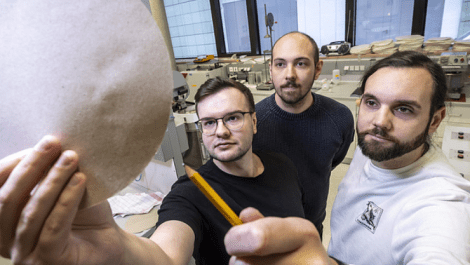Textile printer manufacturer Kornit has staged its London fashion week event, presenting 12 collections by various designers, all featuring digitally printed fabrics and garments produced in a week or less, to audiences that included brands and fulfilment houses as well as the fashion press in order to explain the potential of digital print technology to deliver ‘sustainable fashion’ and to influence much wider change in how the fashion industry operates.
The latest in a series of such international events that began 18 months ago and have included New York, Milan, Tokyo, Los Angeles, and Tel Aviv, the London event also featured keynote sessions and a panel discussion in which supply chain, inventory management and consumer engagement topics were addressed.
As well as aiming to combat the problems of wasteful and polluting production through more sustainable manufacturing practices and returns/recycling initiatives, presentations by Bill McRaith, formerly chief supply chain officer at PVH executive (owner of the Tommy Hilfiger and Calvin Klein brands) Simon Platts, commercial ESG and sustainability director at Asos, and Kornit CEO Ronen Samuel touched on trends ranging from growing ‘instant gratification’ expectations to the potential explosion of creativity that access to rapid and cleaner printed textile production could usher in. He also noted that soft furnishing and other decor items were part of these trends.
Mr Platts confirmed that Asos has experimented with digital print, as has Sandeep Narayan, president of Cotton Division, which has the largest fleet of Kornit printers in Paris, and one of the participants in a subsequent panel discussion. Other panelists included Roei Derhi of Placebo Digital Fashion House, which creates virtual garments for online characters and avatars, and Sasha McFarlane, director of strategic initiatives at PVH, who endorsed the significant increase in profitability possible in what Mr McRaith called a ‘multi-dimensional dynamically optimised network’ production model.
In this model, the established process of essentially guessing demand and seeking to drive down input costs while ignoring subsequent losses to due to wastage and end-of-range mark-downs is replaced by a dynamic exchange of data between brands, retailers and manufacturing/fulfilment sites, allocating production between onshore, near-shore and remote facilities according to run length, lead time and shipping costs.
Kornit’s Mr Samuel provided dramatic figures for waste material and water usage generated by the fashion industry and said that trends such as e-commerce and desire for self-expression, particularly as influenced by social media, as well as a willingness to pay more for environmentally better products were all indicating that a fundamental change is required.
‘Kornit is flipping the script to supply by demand rather than produce for inventory,’ Mr Samuel commented. ‘We are confident that fashion will change forever with a digital-first mindset, liberating brands and fashion producers from the waste quagmire, clearing a path to generations of boundless self-expression, unlimited creativity, and sustainable consumption. Those joining us in London will see and understand that complete new creation journey, fully realised by Kornit and our partners in fashion and tech innovation.’


